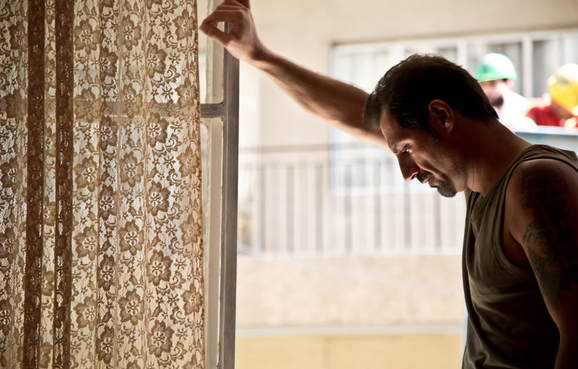THE INSULT
****
Director: Ziad Doueiri
Screenwriters: Ziad Doueiri and Joëlle Touma
Principal cast:
Adel Karam
Kamel El Basha
Rita Hayek
Christine Choueiri
Camille Salameh
Diamand Abou Abboud
Talal Jurdi
Country: France/Cyprus/Belgium/Lebanon/USA
Classification: M
Runtime: 112 mins.
Australian release date: 30 August 2018
Previewed at: Palace Central Cinemas, Sydney, on 23 August 2018.
Set in Beirut, Lebanon, Ziad Doueiri’s The Insult is a riveting depiction of a fairly minor altercation that accelerates from a personal disagreement into a political storm. It serves as a reminder of how fragile and explosive differences of opinion can be, especially in the Middle-East, and how they can lead to intractable consequences, opening painful wounds on both sides. On a more personal level, it’s an instructive lesson in why one should think before one speaks in anger, because once the genie is out of the bottle it’s almost impossible to put it back in. The director says, “the premise for the movie was something that actually happened to me several years ago in Beirut. I had had an argument with a plumber, something very banal, but tempers quickly flared, and I said practically the same words as those in the film. The incident might have been trivial, but subconscious feelings are not. When you spout those words, it is because very personal feelings and emotions have been impacted.”
On a hot afternoon in a suburb of Beirut, a Maronite Christian mechanic, Toni (Adel Karam), is watering plants on his balcony when the overflow drips onto some construction workers in the street below. When their Palestinian foreman, Yasser (Kamel El Basha), knocks on his door to ask if he can fix the pipe, Toni slams the door in his face and retreats inside. Shaken, Yasser fixes the pipe anyway but all hell breaks loose when Toni sees what he’s done and destroys the repair work. Yasser calls him a “prick” and storms off. Talal (Talal Jurdi), Yasser’s boss, implores him to apologise and reluctantly he goes to Toni’s garage to do so but Toni hurls a shocking insult at him and Yasser lashes out. With both his pride and his ribs injured, Toni decides to sue, not for financial gain but because he wants to force an apology out of Yasser. Toni engages a high-powered Christian defence lawyer, Wajdi Wehbe (Camille Salameh), who has a strong track record but who also has his own political agenda, while Yasser is represented by a pro-Palestinian female lawyer, Nadine Wehbe (Diamand Abou Abboud), who just happens to be related to her legal opponent. The ensuing courtroom drama is thus destined to be much more than a fight over a broken drainpipe and promises to bring up much broader, unresolved socio-political issues from the men’s (and Lebanon’s) past, becoming a cause célèbre.
The Insult was selected as Lebanon’s entrant for Best Foreign Language Film at the Oscars this year and, although it didn’t win, it has won a swathe of awards at international film festivals (including Sydney), in particular the Best Actor Award for Kamel El Basha at the Venice Film Festival. It is a masterpiece on many levels, especially the performances - which are superb - and the layered script by Doueiri and his ex-wife Joëlle Touma. The aura of despair and distrust that exists in Lebanon between Moslems and Christians is ingeniously displayed in the tight courtroom shots captured by Tommaso Fiorilli’s cinematography. Credit must also go to Doueiri for nailing this fraught atmosphere with his detailed direction. He succeeds in presenting both sides of the conflict sympathetically, which is not surprising given that he was raised in a pro-Palestinian Sunni family and Touma in a Christian Phalangist one and both are well-versed in the history of Lebanon’s civil war. Talking about his film, Doueiri states, “in this Lebanese story - where nothing is black and white - it is impossible to say ‘here are the good guys and here are the bad guys’.” He goes on, “If I had to sum up this film, I would call it a quest for dignity. The Insult is absolutely optimistic and humanistic. It shows the paths that can be taken to reach peace.”
